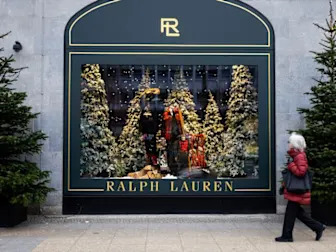By Anuja Bharat Mistry
(Reuters) -Ralph Lauren forecast tepid annual sales on Thursday and said it was weighing price increases, as the Trump administration's steep tariffs start to pressure consumer spending and margins.
The company still beat fourth-quarter estimates for revenue and profit, thanks in part to increased marketing and investments in brands such as Polo and Purple Label, sending its shares about 2% higher in early trade.
"We are assessing additional pricing actions for full-year 2025 and spring of 2026 to mitigate the potential impact of evolving tariffs," said CEO Patrice Louvet on a post-earnings call.
That will be in addition to the proactive pricing Ralph Lauren has already planned for 2025 in North America and Asia, he said.
The apparel retailer expects fiscal 2026 revenue to increase in the low-single digits from last year, including the impact of tariffs, inflationary pressures and spending challenges. Analysts estimate a rise of 4.39%, per data compiled by LSEG.
"The outlook is far more modest. Weakening consumer sentiment and ongoing tensions from trade and geopolitical relations may dampen the appeal of iconic U.S. brands such as Ralph Lauren in overseas markets," said Sky Canaves, analyst with eMarketer.
Ralph Lauren is among the retailers and luxury brands facing the brunt of unpredictable U.S. tariff shifts that have disrupted businesses and rattled shoppers worldwide.
In fiscal 2025, the company sourced about 96% of its products from outside the U.S., with 12% coming from China, according to its annual filings.
China is also a major market for Ralph Lauren products, after North America and Europe.
While the recent 90-day trade truce between Washington and Beijing cut U.S. tariffs on China to 30% from an eye-watering 145%, the relief is expected to be brief for the Asian country's export-reliant economy.
Ralph Lauren also said its gross margins would be squeezed in the second half of the year due to tariffs.
Its revenue of $1.70 billion for the quarter ended March 29 beat estimates of $1.65 billion, while adjusted profit of $2.27 per share trumped estimates of $2.


